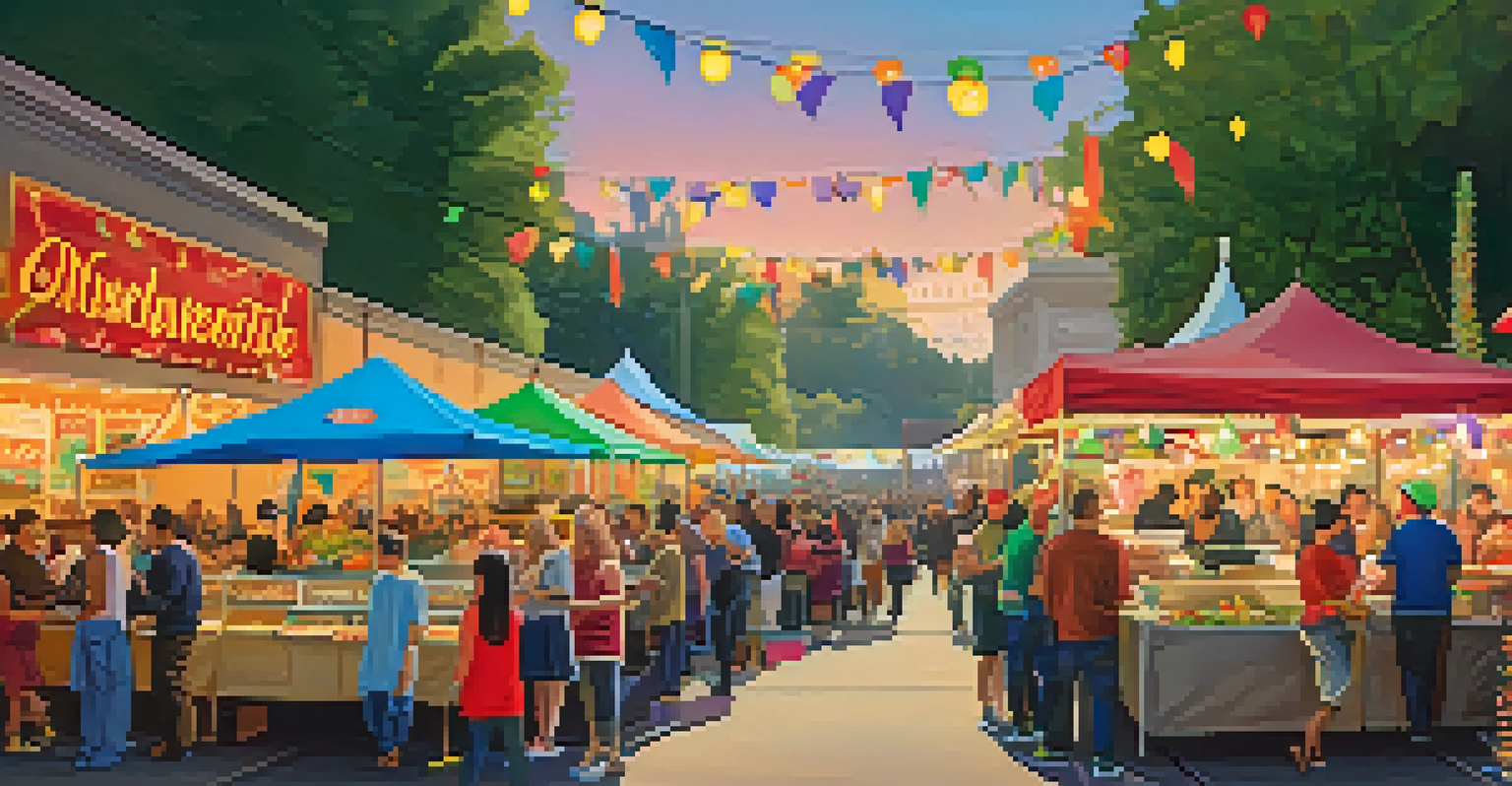Sacramento's Culinary Heritage: A Journey Through Time

The Origins of Sacramento's Culinary Landscape
Sacramento's culinary heritage is deeply rooted in its geography and history. The region's fertile soil and favorable climate made it an agricultural hub, attracting diverse communities and cultures. This rich agricultural background laid the foundation for a vibrant food culture that continues to evolve today.
Food brings us together, and the act of sharing a meal is a universal language that transcends cultural boundaries.
As the Gold Rush brought an influx of settlers in the mid-1800s, Sacramento became a melting pot of culinary traditions. Immigrants from various backgrounds introduced new flavors, techniques, and ingredients, enriching the local palate. These early influences still resonate in Sacramento’s food scene, showcasing a blend of old and new.
The city's commitment to farm-to-fork dining is a testament to its agricultural roots. Today, many restaurants proudly source ingredients from local farms, honoring the region's history while promoting sustainable practices. This dedication not only supports local growers but also enhances the dining experience for residents and visitors alike.
Influence of Indigenous Cuisine on Local Dishes
Long before European settlers arrived, the Native American tribes in the Sacramento area had their own rich culinary traditions. They utilized the land's natural resources, relying on ingredients like acorns, fish, and wild game. These practices laid the groundwork for a food culture that respects and honors the land.

Indigenous cooking methods, such as roasting and smoking, have influenced local dishes that can still be found in Sacramento today. Many contemporary chefs are now exploring these traditional techniques, incorporating them into modern recipes. This revival of interest not only preserves the heritage but also introduces diners to unique flavors.
Sacramento's Rich Culinary Heritage
The city's diverse culinary scene is shaped by its agricultural roots and the blending of various cultural influences.
As more people recognize the importance of indigenous ingredients, there’s a growing appreciation for dishes that highlight these flavors. From acorn flour to locally caught fish, Sacramento's culinary scene is increasingly celebrating its roots. This connection to the past enriches the dining experience and promotes a deeper understanding of the land's history.
The Gold Rush Era: A Culinary Transformation
The Gold Rush era of the mid-1800s was a pivotal moment for Sacramento's culinary scene. As thousands flocked to the region in search of fortune, the demand for food skyrocketed. This influx of people and their diverse backgrounds led to a culinary transformation unlike any other.
Farm-to-table is not just a trend; it's a way to connect with the land, the farmers, and the community.
Restaurants began to pop up, catering to the various tastes of miners and settlers. From hearty stews to freshly baked bread, the options were vast and varied. The blending of flavors and cooking styles during this time created a unique dining experience that reflected the city’s new multicultural identity.
Today, you can still see the echoes of this transformative period in Sacramento's eateries. Many restaurants pay homage to the Gold Rush with dishes inspired by that era, showcasing ingredients and techniques that have stood the test of time. This celebration of history not only honors the past but also fosters a sense of community among diners.
Farm-to-Fork Movement: A Modern Culinary Revolution
In recent years, Sacramento has gained recognition as a leader in the farm-to-fork movement, emphasizing local and seasonal ingredients. This approach not only supports local farmers but also enhances the quality of the food served in restaurants. Diners are increasingly aware of where their food comes from, creating a demand for transparency in sourcing.
The farm-to-fork philosophy encourages chefs to craft menus that change with the seasons, allowing for creativity and variety. This connection to local agriculture fosters a sense of community between producers and consumers, making dining out a more meaningful experience. It’s not just about the meal; it’s about the story behind it.
Emphasis on Farm-to-Fork Dining
Sacramento's commitment to the farm-to-fork movement highlights the importance of local ingredients and sustainable practices.
Events like the Sacramento Farm-to-Fork Festival celebrate this movement, showcasing local produce, wines, and culinary talent. These gatherings highlight the city’s commitment to sustainable practices and community engagement. By participating in these events, diners can immerse themselves in Sacramento's culinary landscape while supporting local businesses.
Culinary Influences from Diverse Cultures
Sacramento’s culinary heritage is a tapestry woven from a variety of cultural influences. With a rich history of immigration, the city has embraced flavors from around the world, creating a dynamic food scene. Whether it’s Mexican, Asian, or Italian cuisine, each culture has left its mark on the local palate.
Food festivals and markets throughout the city celebrate these diverse influences, offering residents and visitors a chance to explore global flavors. From taco trucks to pho shops, the options are endless, reflecting the city's commitment to inclusivity and diversity. This variety not only enriches the food culture but also fosters community connections.
Chefs in Sacramento often draw inspiration from these diverse culinary traditions, crafting innovative dishes that honor their roots. By blending flavors and techniques, they create a unique dining experience that showcases the best of what the city has to offer. This celebration of diversity is what makes Sacramento's food scene truly special.
Artisanal Food Trends Shaping the Scene
In recent years, Sacramento has seen a surge in artisanal food trends that focus on craftsmanship and quality. From handmade pasta to locally roasted coffee, these trends reflect a shift toward more intentional food production. Consumers are increasingly seeking out unique, high-quality products that tell a story.
Artisanal foods often emphasize traditional methods and locally sourced ingredients, creating a connection between producers and consumers. This movement not only supports local businesses but also encourages a deeper appreciation for the culinary arts. Diners are more curious than ever about the origins of their food and the processes behind it.
Artisanal Trends Reshaping Food Culture
A rise in artisanal food trends reflects a growing consumer demand for quality, craftsmanship, and unique culinary experiences.
Local markets and specialty shops have emerged, showcasing the talents of artisans and providing a platform for unique offerings. These spaces allow food lovers to discover new flavors and products, fostering a sense of community among creators and consumers. The artisanal trend is not just about food; it's about building relationships and celebrating craftsmanship.
Sacramento's Culinary Future: A Bright Horizon
As we look to the future, Sacramento's culinary scene is poised for continued growth and innovation. With a strong foundation rooted in history, the city is embracing new ideas and trends. Chefs and food entrepreneurs are exploring creative ways to celebrate local ingredients while pushing culinary boundaries.
The focus on sustainability and community engagement is expected to play a significant role in shaping the future of Sacramento's food culture. As more people become aware of the impact of their food choices, there’s a growing demand for transparency and ethical practices. This shift will likely influence everything from sourcing to cooking methods.

With its rich culinary heritage and a commitment to progress, Sacramento is set to become an even more vibrant food destination. As the city continues to celebrate its diverse influences and innovative spirit, diners can look forward to a dynamic and delicious culinary future. The journey through Sacramento's culinary heritage is far from over; it's just beginning.